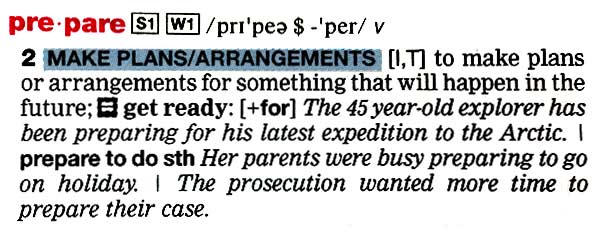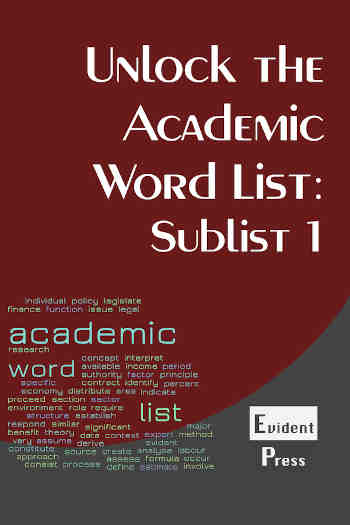Show AWL words on this page.
Show sorted lists of these words.


 







|
 Podcast is loading. Problems? Too slow? You can also access the Podcast by
clicking here.
Podcast is loading. Problems? Too slow? You can also access the Podcast by
clicking here.This message will disappear when then podcast has fully loaded.
A good dictionary is an essential tool for any language learner. It can, however, be difficult to use, and not all language learners fully understand how a dictionary works, or the best type to use. This section will consider different types of dictionary and the advantages and disadvantages of each, as well as looking at the features of a good dictionary. It concludes by looking at ways to improve dictionary use.
Types of dictionary
Dictionaries can be categorised in several different ways. One way relates to the number of languages used. Most beginning students will start with a bilingual dictionary, which has words in English translated into their own language (the prefix bi- means two). A more advanced type of dictionary is a monolingual dictionary, which is entirely in one language (the prefix mono- means one). While a bilingual dictionary is generally easier to use than a monolingual one, the information it contains may not be as comprehensive. Another disadvantage of a bilingual dictionary is that the student may rely too much on their own language, rather than thinking and working in English. Progressing from a bilingual to a fully monolingual dictionary is one sign that a language learner is becoming more confident and proficient in their language use.
Another way to categorise dictionaries is by format. The traditional dictionary is a book in paper format. However, electronic dictionaries, such as those which can be downloaded to a mobile phone, are now extremely popular, perhaps more so than paper dictionaries. Online dictionaries are another popular format. Electronic (and, to some extent, online) dictionaries have the advantage of being very lightweight. Additionally, searching for words is usually very quick. A disadvantage is that they may not contain the same level of detail as a paper dictionary (though many of the most well-known dictionaries are available in electronic versions which are identical to the paper one). Another disadvantage is that, because of how the word is retrieved (by typing it in), students will lose the chance to practise scanning skills, in contrast to how they look up the word in a paper dictionary.
A third way to categorise dictionaries is by content. In addition to general English dictionaries, there are dictionaries for specific types of word, such as idioms, places, abbreviations, slang and so on, and dictionaries for words used in particular fields, such as medical English or English for economics. These specialist types of dictionary are of course useful for those studying or interested in particular areas. However, specialist terms will usually be explained or defined where they appear (in a book or lecture), unlike general academic words, which usually will not. For improving academic English, a general English dictionary is essential. The rest of this page will consider general rather than specialist English dictionaries.
A final way to categorise dictionaries is by level. Students may start their English study with a beginner's dictionary. For academic English study, however, a higher level of dictionary is required. An intermediate level dictionary might be acceptable at the initial stages of an academic English course. The range of vocabulary used in academic texts, however, means that an advanced dictionary will eventually be essential.
Features of a good dictionary
The features of a good dictionary relate fairly closely to the features of vocabulary a learner needs to study. They include meaning, usage, grammar, spelling and pronunciation. A few other areas are also considered.
Meaning
The most important information about a word that a dictionary contains is the meaning. One word can have many different meanings, some of which may be very similar to each other, while some might be quite different. The meanings are usually listed in order of frequency, in other words so that the most common meaning comes first, with the least common one at the end. Consider the following two sentences, using the word appreciate.
- Few people appreciate the importance of a good dictionary.
- He appreciated the help his teacher gave him.
The following is the dictionary entry for this word, taken from Princeton's Wordnet database (a copy of which is available on this website).
1. recognize with gratitude; be grateful for.
2. be fully aware of; realize fully. E.g.: Do you appreciate the full meaning of this letter? [Syn: take account]
3. hold dear. [Syn: prize, value, treasure]
4. gain in value. E.g.: The yen appreciated again! [Syn: apprize, apprise, revalue]
5. increase the value of. E.g.: The Germans want to appreciate the Deutsche Mark [Syn: apprize, apprise]
The meaning for the word appreciate in the first sentence is 'be fully aware of', which is the second meaning in the list. The meaning of appreciate in the second sentence is 'be grateful for', the first meaning in the list. These meanings are quite different. As the first meaning is more common, it is more likely that a student would know this one, and less likely that they would know the second meaning.
Usage
A good dictionary will also provide examples of usage. This is generally done in two ways. One is by explicitly giving this information. Consider the following example for the word prepare from the Longman Dictionary of Contemporary English.

This entry tells us that for the meaning of 'get ready' the word prepare is followed by for, and that when followed by a verb, the form should be to do sth (not 'doing sth').
The other way to give information on usage is indirectly, via examples sentences alone, without explicitly giving the usage information. In this case, the learner has to look more carefully to understand how the word is used.
A dictionary might show usage by indicating which prepositions a word is used with, for example afraid of, interested in or good at. It may also give information on common collocations for the word. Understanding how a word combines with other words in a sentence is important if it is to be used productively in speaking and writing. Information on usage will help the learner to appreciate that vocabulary study is not just about single words, but involves considering groups of words which go together.
Grammatical information
A good dictionary will give grammatical information about each word. The most basic type is part of speech, that is whether the word is a noun, verb, adjective, adverb and so on. Other grammatical information which can be given is whether a noun is countable or uncountable, whether a verb is irregular, or whether a verb is transitive (i.e. followed by an object), intransitive (not followed by an object) or both. Most dictionaries will use a series of abbreviations for this, for example [U] for uncountable, irreg for irregular, and vt and vi for transitive and intransitive verbs respectively.
Spelling
English spelling can be a very difficult area even for those whose first language is English. A dictionary will obviously be useful in checking the spelling of words, which is important for writing. If you are typing up an essay or assignment, the word processing software you are using will almost certainly have a spellcheck function which will probably be your first step in checking spelling, for example when proofreading. Where a dictionary is most useful is in pointing out special spelling rules, such as whether a final letter needs to be doubled when creating verb forms, such as format which has verb forms formats, formatted and formatting. A dictionary will give information on variant spellings, for instance British versus American English.
Pronunciation
A good dictionary will also give information on pronunciation, which is especially important if you want to use the word in your speaking. A paper dictionary will do this using the phonemic alphabet, which is a transcription using special symbols. Getting used to these symbols takes time and practice. This transcription will include a mark showing where the stress in a word is if it contains more than one syllable. Pronunciation is one major advantage of an electronic or online dictionary, as these types of dictionary will generally enable you to listen to the word.
Other information
A dictionary may give other useful information. For example, it may tell you about frequency, in other words how common the word is. It may also give information on register, in other words whether it is formal or informal, or used in spoken rather than written English. A dictionary may also indicate whether a word or meaning is used in a specialist subject.
Improving dictionary use
There are several ways a student can improve their dictionary use. The most obvious way is to use it regularly and therefore become familiar with how it works. As noted above, dictionaries will employ a series of abbreviations, such as [U] for uncountable nouns, and becoming familiar with these will make it easier to use a dictionary. If using a paper dictionary, learning the phonemic alphabet will help the student to be able to pronounce the words.
There are various ways in which teachers can improve dictionary use in their students. One way is to encourage its use in (or outside) class. Some teachers may be reluctant to do this as they might want students to try to guess the meaning of words rather than turn to a dictionary. While it is true that good learners do not use a dictionary for every unknown word and try to guess the meaning first, it is rarely possible to guess the meaning of all unknown words accurately, and checking in a dictionary is usually necessary.
Another way in which a teacher can improve dictionary use is to recommend a dictionary for their students. As noted above, there are a wide array of dictionaries available, and learners may be confused about the type of dictionary which suits them best.
A third way in which teachers can improve dictionary use is to engage in learner training with dictionaries, for example quizzing students on the different abbreviations used in a dictionary, or asking which of the different meanings of a word is the one used in the context in which the word is found. This type of learner training works best if all students are using the same dictionary.
A final way in which a teacher can improve dictionary use is by encouraging students to check meanings in more than one dictionary. This will enable them to understand that a dictionary is a source of information, and turn them into researchers, in much the same way that they will research information from more than one source for assignment use.
References
Gillett, A. (n.d.) Learning vocabulary: Dictionary use. Available at: http://www.uefap.com/vocab/learn/dic.htm (accessed 30 April, 2018).
Olwyn, A., Argent, S. and Spencer, J. (2008) EAP Essentials: A teacher's guide to principles and practice (pp.174-175). Reading: Garnet Publishing Ltd.
Redman, S., Ellis, R. and Viney, B. (1997) A Way With Words: Resource Pack 1. Cambridge: Cambridge University Press.
Scholfield, P. (n.d.) Dictionaries. Available at: https://www.llas.ac.uk/resources/gpg/229.html (accessed 30 April, 2018).
Checklist
The following checklist summarises the information on this page. Use it to check your understanding.
| Area | OK | Comments |
| I know the different types of dictionary (bilingual, monolingual and so on) and some of the advantages and disadvantages of each. | ||
| I understand the features of a good dictionary, including meaning, usage, grammar, spelling and pronunciation. | ||
| I know some ways in which I can improve dictionary use. |
Next section
Read more about recording vocabulary in the next section.
Previous section
Read the previous article about word roots.



